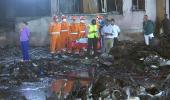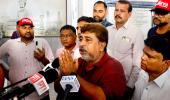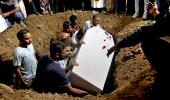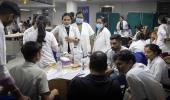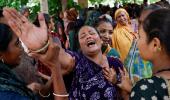'Grief united all of us as Ahmedabadis.'

When Mufti Abdul Qayum got a WhatsApp message at 2.30 pm on June 12 saying a plane had crashed in Ahmedabad, his initial reaction was one of disbelief.
He thought it was one of those fake news WhatsApp forwards with no truth behind it.
But by 3 pm, he learnt that for real an Air India aircraft had plunged into a medical college hostel within five minutes of takeoff from Ahmedabad airport.
AI 171 was heading to London Gatwick with 242 on board, of who one passenger had a miraculous escape.
"As the news got confirmed our organisation sent three ambulances and a team of doctors to help survivors," says the Mufti, who is from the Jamiat-Ulama-i-Hind (Maulana Arshad Madni faction).
The help was timely because the place where the Mufti operates from, the Daryapur area in Ahmedabad, is close to the accident site.
"Grief united all of us as Ahmedabadis. RSS and Jamiat workers joined hands in rescue work. It was a unique display of brotherhood between us at a time of national grief. It was all about helping humanity," the Mufti says.
The Mufti's organisation was not the only Muslim outfit to lend a helping hand to the affected family members of crash victims, many others also joined in.

Says Zaid Mansuri, who runs an NGO, the Aafiyat Foundation, in Ahmedabad, "We arranged for 2,000 bottles of mineral water and sent it to the crash site. Another team of volunteers was sent to the Ahmedabad civil hospital to donate blood."
"Our volunteers regularly donate blood at the Ahmedabad civil hospital as and when they require it. But this time we knew there would be a shortage so we turned up in big numbers to donate blood," adds Mansuri.
"It was time for qaumi ekta aur insaniyat (communal harmony and humanity) for everyone in Ahmedabad. We worked in tandem with RSS volunteers at that moment. It was a time of crisis," says Mansuri.
Daniyal Delhiwala, founder of the Genuine Help Foundation, sent 70 of his team members for blood donation.
"When we reached the Ahmedabad civil hospital we realised that there was only one survivor in the plane crash, 241 passengers and crew members had died. So blood was in over-supply and our volunteers started helping with other work like placing dead bodies on the stretchers and providing breakfast to the injured and relatives of the deceased," says Delhiwala.
Asked what was his most traumatic experience, Mansuri says, "Helping the relatives of the deceased take the DNA test was emotional trauma for me. Every relative wanted to see their loved one's body but sadly it was not possible because of the fire."
"Every dead passenger left a unique story after their death for us. My heart cries for them even as we speak."
